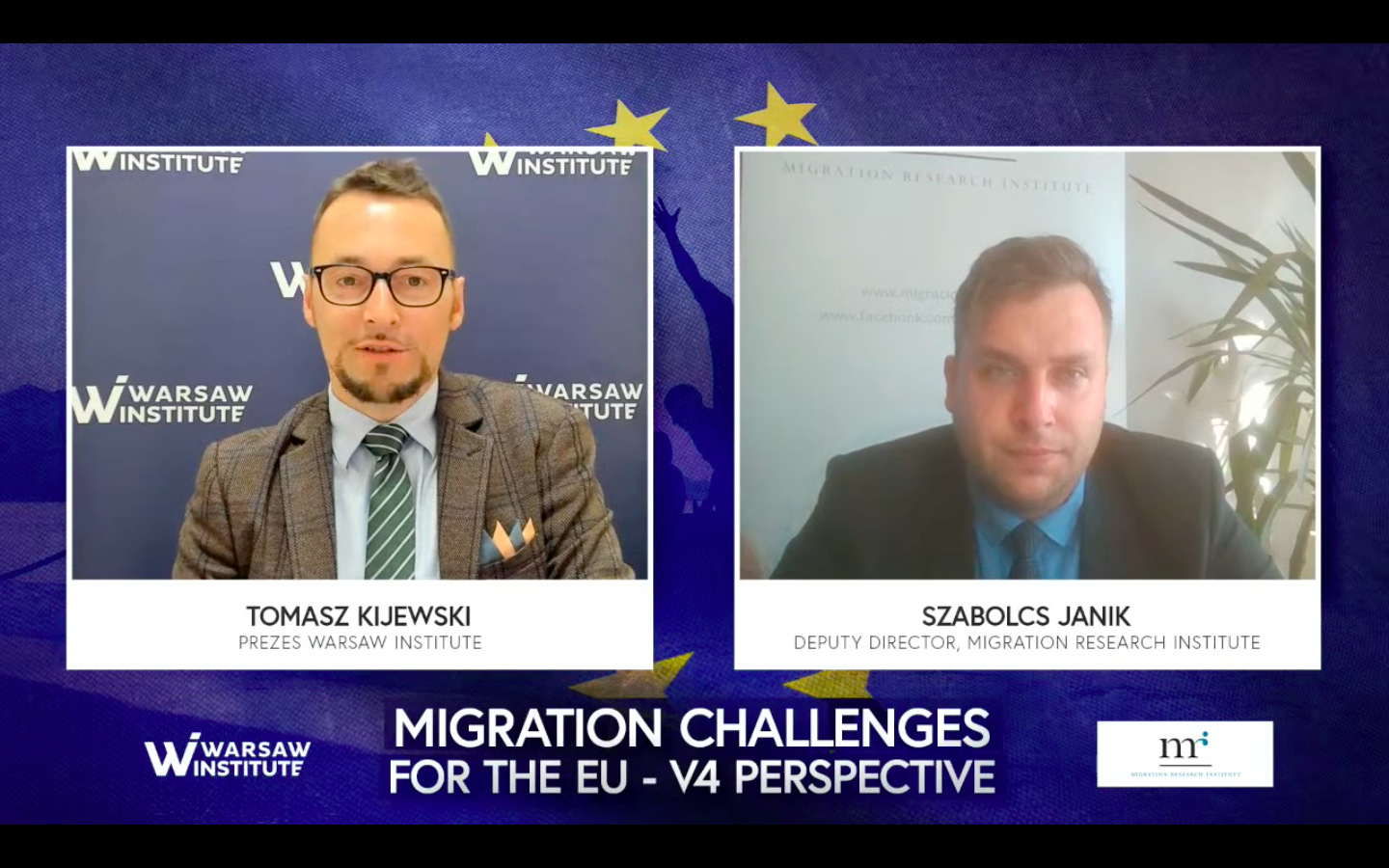EVENTS
Event Summary: Migration Challenges for the EU – V4 Perspective
Migration challenges for the EU from the perspective of the V4 countries were the main topic of the online event organized on July 5, 2021 by the think-tank Warsaw Institute in cooperation with the Migration Research Institute. The guest of Tomasz Kijewski, the president of the Warsaw Institute, was Szabolcs Janik, Deputy Director at the Migration Research Institute.
The first question asked to the guest of the Warsaw Institute concerned the genesis of the Migration Research Institute in Hungary. Szabolcs Janik replied that during the recent migration waves, which started in 2014, Hungary was treated by migrants as a transit country to Western Europe. The migration movement has influenced many aspects of social life, and this fact requires a more detailed research perspective.
Tomasz Kijewski, president of the Warsaw Institute, also asked about the trends currently observed by researchers from the Institute for Migration Research. Szabolcs Janik pointed out that today, unlike the years of the peak migratory waves in 2015 and 2016, Turkey has almost completely closed its borders to migrants. This is important as it was the main transit country to Central and Western Europe for migrants from the Middle East. The border situation has changed as a result of the EU-Turkey agreement, in exchange for a special-purpose subsidy of EUR 6 billion for the Turkish side to support Syrian migrants residing in Turkey. The guest of the Warsaw Institute also indicated other migration directions to Europe. Interesting for the observer of the discussed problem is the phenomenon of migration from Bangladesh to Italy, due to the geographical location of the indicated regions (they are distant from each other).
Another issue raised was the identification of migration-related problems. During the conversation, it was indicated that the consequence of the migration waves is a political crisis in the dimension of the entire European Union. The Dublin arrangements pointing to the quota division of refugees as part of their relocation turned out to be a failure – Member States refused to accept the order.
The President of the Warsaw Institute also asked the guest about the undoubted effectiveness of the V4 countries’ policy in the context of the migration problem. Szablocs Janik pointed out that 2015 and the peak of the crisis built a kind of occasional cooperation within the Visegrad Group, as the interests of the Member States largely coincided. The member states have imposed their own migration policy in addition to the basic one, the EU one. It is worth noting that this cooperation in the field of migration continues and is treated as a topic directly related to international security, and the obligatory relocation scheme – a threat to sovereignty.
The next stage of the conversation was to point to the instruments of the EU policy towards solving the still recurring problem of irregular migrations. One of the nine legal instruments is worth considering. The first is the procedure to be introduced at the EU’s external borders for third country nationals, as the Commission thought it would be programmed to ensure legal entry. The whole thing would be an extended asylum procedure. Sabocs Janik claims, however, that despite the apparent effectiveness on the theoretical level, the idea loses its value after taking into account real border protection with a complicated “screening” system. Southern European countries, such as Greece, Italy and Spain, are not able on their own, even with the support of FRONTEX, to provide their citizens with security related to controlled migration. An important element contributing to uncertainty in European public opinion is the number of terrorist attacks organized by immigrants, both illegal and legal, but still – external immigrants.

SPECIAL GUEST
Szabolcs Janik,
Deputy Director, Migration Research Institute
Szabolcs Janik is a political scientist and economist, currently conducting his PhD studies in political science at Corvinus University of Budapest. His dissertation topic and his professional interest are centred around the Visegrad cooperation. Previously he worked at, among others, the Ministry of Foreign Affairs and Trade of Hungary. At the Migration Research Institute (MRI), he is engaged in analysing the economic and political impact of contemporary migration to the European Union.
MODERATOR
Tomasz Kijewski, president of the Warsaw Institute
Tomasz Kijewski graduated international relations at the University of Lodz (scholarship at the Center for Transatlantic Studies in Maastricht, the Netherlands) and post-graduate studies at the Military Academy in Warsaw. He is a graduate of National Security Study Program (PASS) at the European Center for Security Studies General Marshall (Garmisch-Partenkirchen / Washington DC). He completed a course at the International Energy Agency (Paris) and was an energy advisor in Calgary. Performing diplomatic duties, for many years he actively promoted Poland and the Polish diaspora in North America. His areas of interest include new forms of international conflicts (hybrid war, asymmetric conflicts), counteracting terrorism, energy security. Prepares a doctoral dissertation.
We encourage you to watch the full conversation and follow our future work!
All texts published by the Warsaw Institute Foundation may be disseminated on the condition that their origin is credited. Images may not be used without permission.















